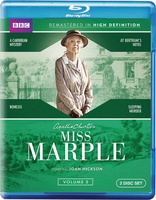Miss Marple: Volume 3 Blu-ray Movie
HomeMiss Marple: Volume 3 Blu-ray Movie 
A Caribbean Mystery / At Bertram's Hotel / Nemesis / Sleeping MurderBBC | 1987-1989 | 450 min | Not rated | Jun 09, 2015
Movie rating
8.1 | / 10 |
Blu-ray rating
| Users | 0.0 | |
| Reviewer | 4.0 | |
| Overall | 4.0 |
Overview
Miss Marple: Volume 3 (1987-1989)
Gather your wits and join best-selling author Agatha Christie’s popular sleuth Miss Jane Marple in four delightfully baffling mysteries starring Joan Hickson, the actress Christie herself wanted for the title role.
Starring: Joan Hickson, David Horovitch, Ian BrimbleDirector: Martyn Friend, Christopher Petit, Mary McMurray, David Tucker
| Period | Uncertain |
| Crime | Uncertain |
| Drama | Uncertain |
Specifications
Video
Video codec: MPEG-4 AVC
Video resolution: 1080p
Aspect ratio: 1.33:1
Original aspect ratio: 1.33:1
Audio
English: DTS-HD Master Audio Mono
Subtitles
English SDH
Discs
50GB Blu-ray Disc
Two-disc set (2 BDs)
Playback
Region A, B (C untested)
Review
Rating summary
| Movie | 4.0 | |
| Video | 4.0 | |
| Audio | 4.0 | |
| Extras | 2.0 | |
| Overall | 4.0 |
Miss Marple: Volume 3 Blu-ray Movie Review
Reviewed by Jeffrey Kauffman May 29, 2015Rarely has one actor been so thoroughly associated with a role as David Suchet has been with Agatha Christie’s inimitable Poirot, despite legendary performers like Albert Finney (who was Oscar nominated in Murder on the Orient Express) and Peter Ustinov also tackling the part. Christie’s other iconic detective, mild mannered spinster Jane Marple, has had a somewhat more varied screen life, though if one were to associate an actress with the role, chances are it would be Joan Hickson, who played Miss Marple for around eight years from 1984 to 1992. While Gracie Fields had essayed the role for television in the fifties, it was the ebullient Margaret Rutherford who was first strongly associated with Marple in a series of big screen comedy-mysteries which were quite popular in the early sixties. (In fact MGM attempted to launch a Poirot series in the wake of the Marple successes, but their only effort, The Alphabet Murders, tanked, perhaps due to the somewhat odd casting of Tony Randall in the role.) Rutherford’s Marple wasn’t exactly Christie’s character, but she was memorable and amusing. Over twenty years later Hickson (who had a small role in the Rutherford Marple Murder, She Said) stepped into the role, to the approval of Christie herself, who had evidently once told Hickson that when Hickson was a bit older, she hoped the actress would play the part. The Hickson Marples may seem quaint to younger viewers who have become used to the latest reboots featuring actresses like Geraldine McEwan or Julia McKenzie, versions which have in some instances radically changed Christie’s plotlines in a risky gambit, done perhaps to keep longtime fans guessing, that has nonetheless angered purists who feel Christie can’t be bettered. While actresses as notable as Angela Lansbury and Helen Hayes have also stepped into the Marple role, Hickson’s characterization will probably forever be held up as the paradigm. She may not have had the duration of Suchet in Poirot, but her impact can’t be minimized.
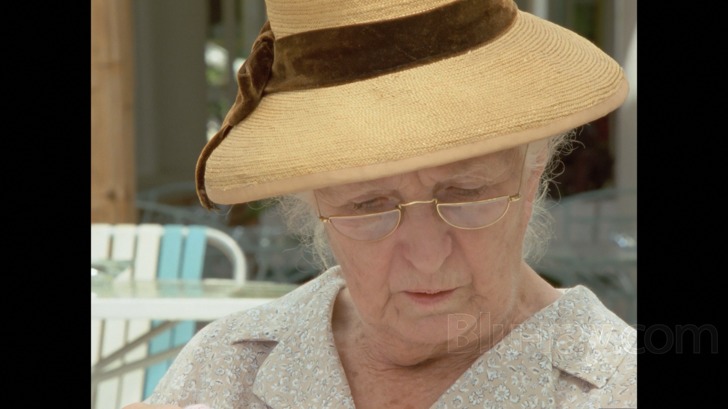
The four episodes in this volume of Miss Marple are:
A Caribbean Mystery. Miss Marple gets out of the dreary, rainy climes of St. Mary Mead (a weather situation which provides a bit of a joke at the end of the episode) to enjoy a vacation on Barbados sprung for by her nephew, who is hoping the change in venue will help his aging aunt recover from some recent illnesses. Miss Marple is uncharacteristically a bit bored and distracted by the pleasant location, spending a lot of time knitting out in the sun. It’s during one such instance that she fails to listen very carefully to a blowhard named Major Palgrave (Frank Middlemass), a seemingly dotty old guy with a long ago career in law enforcement who keeps blathering on about old cases. You’d think the Major’s mention of tracking down a murderer to the gorgeous island would prick up Miss Marple’s ears, but she doesn’t really pay that much attention, a distraction which comes back to haunt the sleuth after the Major shows up dead the next day. Rumors of high blood pressure and a natural death don’t hold much sway with Miss Marple, especially after a second victim, a hotel worker who may have some incriminating evidence of Palgrave’s death being a murder, also shows up.
As in virtually all Christie outings, there is a veritable bevy of interesting suspects at hand, including two sets of interlinked couples who are on a working holiday documenting some of the insect life of the island, as well as the hotel’s new owners Tim (Adrian Lukis) and Molly Kendal (Sophie Ward, looking for all the world like Gwyneth Paltrow’s long lost sister). What’s probably most interesting about this episode, though, is the introduction of Jason Rafiel (Donald Pleasance), the crusty old gazillionaire who initially can’t stand Marple (the displeasure is returned, thank you very much), but who soon realizes the unassuming old lady has a steel trap mind.
Interestingly, Rafiel is the driving force (albeit from the grave) behind Nemesis (also included in this set), but weirdly A Caribbean Mystery was produced and aired after Nemesis. Colorful and benefitting from an unusual setting, A Caribbean Mystery is nonetheless a bit haphazard in presentation, glossing over plot points with regard to the entomologist quartet, but really springing to life in the scenes between Pleasance and Hickson. The episode is not helped by an often overbearing and unhelpful score. Whoever was in charge of source cues wasn’t paying attention to the supposed timeframe of the episode: Miss Marple clearly looks at a library book with a 1951 checkout date, but one of the songs playing at the hotel is “Felicidade” from the 1959 film Black Orpheus . (Bossa nova enthusiasts like yours truly were similarly distraught when an Astrud Gilberto tune showed up at least a year or two “too early” on Mad Men in its early going.)
At Bertram’s Hotel. In a somewhat wistful setup, Miss Marple returns to an old fashioned lodging establishment she used to frequent as a little girl, hoping to find, as a concierge mentions, “not very much has changed.” While much closer to Christie’s original formulation than the Marple reboot version (the “new, improved” Marples are so far only available on this Blu-ray, which does not include “At Bertram’s Hotel”), this is one of the less satisfying outings in the Hickson canon. Christie aficionados used to cross generational links between characters are going to guess one major plot point involving two people at the hotel long before it’s actually detailed, something that undercuts a lot of the suspense of the enterprise.
What’s perhaps most interesting about At Bertram’s Hotel is how it initially at least doesn’t even involve Miss Marple’s typical old standby, murder. Instead Miss Marple begins to become suspicious about various activities going on around the hotel, while at the same time a string of robberies gets linked to a most unlikely suspect, an addlepated man of the cloth, Canon Pennyfather (Preston Lockwood). By the time murder (or at least attempted) murder rears its ugly head, Miss Marple is further ensconced with local celebrity Lady Bess Sedgwick (Caroline Blakiston), a globetrotting adventuress whose colorful past may have a connection to young Elvira Blake (Helena Michell, daughter of Keith of The Six Wives of Henry VIII fame). Never very suspenseful but filled with a certain sense of nostalgia, At Bertram’s Hotel probably only goes to prove the famous Thomas Wolfe adage that you can’t go home (or to a hotel) again.
Nemesis. Despite being at least partially dependent on information and background provided in A Caribbean Mystery, Nemesis was first to air in this version of Miss Marple, introducing the unbelievably wealthy Jason Rafiel (played here, albeit briefly, by Frank Gatliff), who is in fact on his deathbed (and/or comfy chair, as the case may be). Rafiel, still machinating if perhaps a bit less crusty than in A Caribbean Mystery, is up to something, though it’s not initially clear exactly what. He mentions his estranged son Michael to an assistant while also discussing the ins and outs of some “web” he’s woven for his old “Nemesis” (as in Greek mythology). Soon Mr. Rafiel has shuffled off this mortal coil, and the rest of Nemesis amounts to something of a post mortem scavenger hunt arranged by the tycoon that could result in a handsome payday for Miss Marple.
Rafiel has arranged for Marple to go on a coach tour with a highly specific itinerary, surrounded by people whom Rafiel himself selected to be her co-travelers. The one exception is Marple’s hapless nephew Lionel Peel (Peter Tilbury), who accompanies his aunt after having been locked out of his house due to some marital skirmishes. Miss Marple is given very little information by Rafiel’s Dickens-esque solicitors as to what she’s supposed to accomplish, only that she’ll know what it is once she’s done it. She rather quickly decides (correctly, of course) that Rafiel’s quest must have something to do with a long ago murder accusation leveled against Rafiel’s son, Michael (Bruce Payne), a young man who has since gone off the grid and is living as a homeless vagrant. At least some of Marple’s fellow travelers have salient information about this long ago crime, as well as the victim—a young girl named Verity with whom Michael was romantically involved.
This is a fairly complex (if ultimately pretty straightforward) Marple outing, with more than the usual bevy of suspects, especially once Miss Marple goes to stay with a gaggle of eccentric sisters at a wayside, siblings who may recall the women from a non-Marple entry called The Pale Horse (a story which was ported over into Marple territory for the reboot, and which is included on the above linked Blu-ray set). Part of the fun of Nemesis is that it’s so patently contrived—by Jason Rafiel. Until relatively late in the proceedings, there’s not even a “new” murder to contend with, leaving most of the mystery residing in what game Jason Rafiel has recruited Miss Marple to play.
Sleeping Murder. This is perhaps Agatha Christie’s homage to déjà vu, that unsettling feeling of having been someplace or done something before that is psychologically being mirrored during some contemporary event. Young newlywed Gwenda Reed (Geraldine Alexander) is touring the English coast with her dashing husband Giles (John Moulder Brown) when the two pass by an imposing seaside estate that is for sale. Gwenda says it’s just the sort of home she’s always dreamed of living in, and the two arrange a tour. Gwenda seems almost prophetic in detailing the specifics of the house’s layout before she even gets to certain rooms, and upon coming to the head of a staircase, she has a sudden physical infirmity strike her which is linked to a flashback of some kind, though Gwenda initially thinks perhaps the house is haunted (a thesis she continues to hold as the plot progresses).
Soon enough Miss Marple is on hand, dealing with the fact that Gwenda, a New Zealander who has supposedly never before set foot in England, has such disturbing if detailed memories of the very house she has ended up buying. Miss Marple soon determines that Gwenda’s flashes of having seen a murder in the house as a young toddler are no mere figments of her imagination, and an investigation into Gwenda’s long dead parents (and step parents) is undertaken, one that soon involves long lost quasi-relatives and, in some cases, former domestics.
From a plot construction standpoint, this is pure Christie gold, something that’s even more commendable given the fact that the tale has relatively few viable suspects for the long ago murder. As is typically the case in Christie outings, there’s ultimately a contemporary killing to contend with, and the denouement offers the unraveling of a kind of sordid set of relationships from years past. Trivia lovers may be interested to know that Sleeping Murder, while written in the 1940s, was one of two Christie books the prolific author put “into trust” (as it were), initially at least shelved in a bank archive to be published after her death in order to benefit her heirs. As it turned out, Christie ultimately agreed to the publication of both “in trust” books (the other being Curtain, the final Hercule Poirot outing) prior to her passing, but as it ultimately came to pass, she died before Sleeping Murder finally saw the light of day.
Miss Marple: Volume 3 Blu-ray Movie, Video Quality 
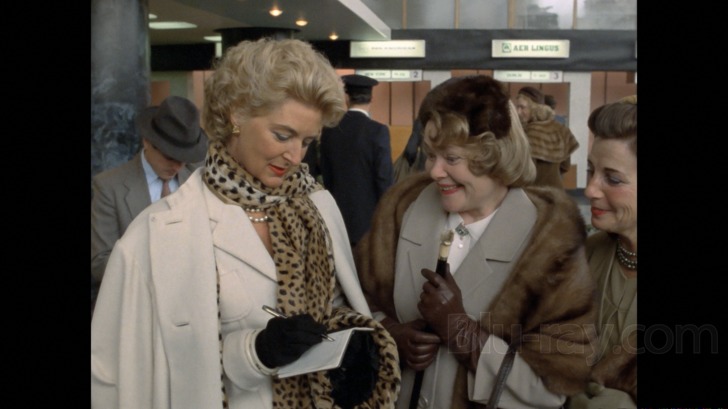
Miss Marple Volume 3 is presented on Blu-ray courtesy of BBC with an AVC encoded 1080p transfer in 1.33:1. This latest (and, sadly, last) volume of Miss Marple continues largely along the same commendable lines as in Miss Marple: Volume 1 and Miss Marple: Volume 2, though occasionally grain management proves to be a bit less consistent in this outing, leading to brief anomalies like what almost appears as image instability (it's not) on the extreme left side of the frame during the credits sequence for A Caribbean Mystery. Each episode has brief moments where grain clumps just a bit unnaturally, tending to be a bit more noticeable in dark sequences. Otherwise, though, this is by and large another huge step up from previous home video releases of this venerable series. Color timing is once again hugely improved, and sharpness and clarity are generally very pleasing, given an understanding of the limitations of the original 16mm elements. Quite a bit of these particular episodes offer scenic moments out of doors, and those pop with a new freshness and immediacy. Close-ups offer generous amounts of detail, as can be seen in several of the screencaptures accompanying this review.
Miss Marple: Volume 3 Blu-ray Movie, Audio Quality 
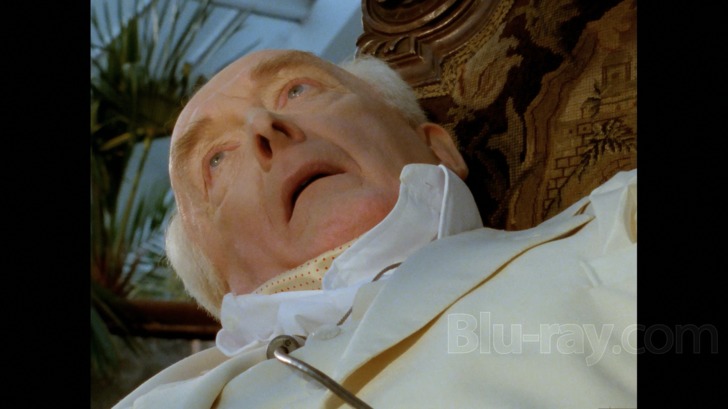
Miss Marple Volume 3 offers DTS-HD Master Audio Mono tracks on all four episodes. While never showy in any real way, these tracks more than capably support the dialogue, as well as ambient environmental effects and the scores (of somewhat variant quality). Fidelity is fine and there are no problems of any kind to report in this review.
Miss Marple: Volume 3 Blu-ray Movie, Special Features and Extras 

- A Very British Murder - Part Three: The Golden Age (1080i; 50:05) wraps up the multi-part documentary that has been accompanying the previous volumes of Miss Marple. This one focuses on 20th century luminaries like, you guessed it, Agatha Christie.
Miss Marple: Volume 3 Blu-ray Movie, Overall Score and Recommendation 
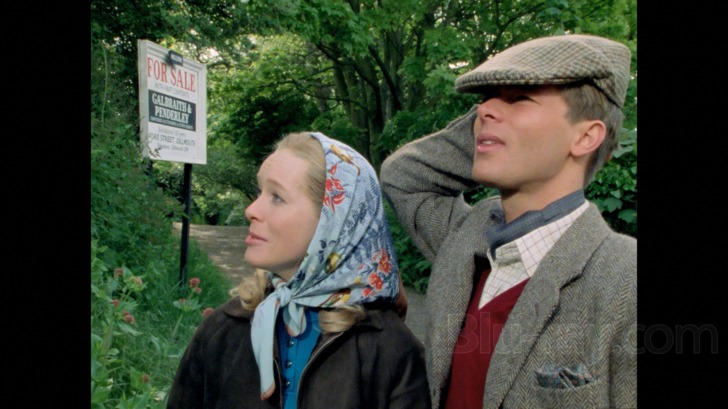
I've kind of felt like Miss Marple visiting Bertram's Hotel as I've wended my way through all three volumes of these old episodes which I've loved since my (relative) youth. BBC has done a remarkable job restoring these old gems, and to say the episodes have a new luster may not be doing them enough service. The four stories on this volume offer the requisite amounts of intrigue, and several of them are almost like travelogues at the same time. Hickson's Marple continues to delight all these years later, and with technical merits being so pleasing, Miss Marple Volume 3 easily comes Highly recommended.
Other editions
Miss Marple: Other Seasons

Miss Marple: Volume 1
The Murder at the Vicarage / The Body in the Library / The Moving Finger / A Murder is Announced
1984-1986

Miss Marple: Volume 2
They Do It With Mirrors / A Pocketful of Rye / 4.50 From Paddington / The Mirror Crack'd From Side to Side
1985-1992
Similar titles
Similar titles you might also like
(Still not reliable for this title)

Poirot: Murder on the Orient Express
2010

Stage Fright
Warner Archive Collection
1950

Twisted
2004

Waiting for Forever
2011

Downton Abbey: The Motion Picture 4K
2019

The Paperboy
2012

The Man in the Gray Flannel Suit
1956

Atlas Shrugged: Part II - The Strike
2012

Lonely Hearts
2006

The Deep End of the Ocean
1999

The United States of Leland
2003

A Stranger Among Us
1992

The End of the Affair
1999

Rookie Blue: The Complete Second Season
2010

Under Suspicion
1991

Water for Elephants
2011

A Bill of Divorcement
1932

Great Expectations
2011

Adore
Perfect Mothers
2013

The Children's Hour
1961
